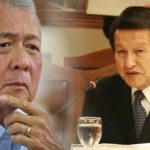Has America failed the Filipinos?
This is what Foreign Affairs Secretary Perfecto Yasay said in his Facebook post, which was later posted on the official website of the Department of Foreign Affairs. He said that President Rodrigo Duterte is trying to liberate the Filipinos from their “submission to American demands and interests” after they have been treated by the US with a “carrot and stick” policy (an idiom for the policy of offering rewards and punishment to induce behavior).
He also pointed out that it has been 70 years since the US acknowledged Philippine independence.
Yasay said that while America has given the Philippines countless things to be thankful for, the country ended up being unable to protect its territorial boundaries and the defensive forces are still incapable of responding to security threats. Echoing what President Rodrigo Duterte said earlier, Yasay also said that the US still fails to give the assurance that it will defend the Philippines under the existing military treaty and agreements between both countries.
Yasay then emphasized Duterte’s goal in realigning the country’s independent foreign policy – to assess America’s willingness to change how they deal with the Philippines in accordance to “geopolitical realities.” Then he offered another possibility – that the US may choose to ignore the Philippines’ pleas amid its concern for the alleged human rights violations in the country as the Duterte administration tries to address its “pressing domestic problems.”
But Facebook user Bernard Ong posted what seemed like a response to Yasay.
According to Ong, it’s not exactly the Americans who failed us. He then cited how over 17,000 US Marines died fighting alongside the Filipino soldiers during World War II.
[ads1]
“The largest number of dead US Marines & their comrades from WW2 – 17,201 to be exact – are buried right at the heart of Fort Bonifacio. And the living ones continue to help the Philippines in our time of need,” Ong wrote.
According to the American Battle Monuments Commission (ABMC), the Manila American Cemetery in Fort Bonifacio “contains the largest number of graves of [American] military dead of World War II, a total of 17,201, most of whom lost their lives in operations in New Guinea and the Philippines.”
He added that while he does see fault in how the American seemed unwilling to provide the Philippines the assurance that they would fulfill their obligations as per the US-PH mutual defense treaty, he does not agree with Duterte and Yasay’s description of the Filipinos as the Americans’ “shackled little brown brothers.”
Ong pointed out that Singapore, South Korea and Japan were able to modernize their countries in various aspects in spite of being allied with the US.
“In fact, they immensely benefited from US trade, investments & security guarantees,” Ong said.
So who exactly failed the Philippines? Ong put the blame on the following:
“1. Trapo Dynasties. The same political clans have monopolized political power in the Philippines – often occupying positions in different branches of government, rotating positions to avoid term limits, circumventing checks and balances. They engage in patronage politics with poorer constituents, and transactional rent-seeking arrangements with richer cronies.
- Cronies. Several of our comparative weaknesses – costly power, costly & slow internet, high logistics costs – are results of cronies charging higher prices to recover bribes paid out, plus ‘regulatory capture’ by having their allies appointed into key positions in regulatory agencies.
Recent examples include Duterte’s appointment of an ex-Globe exec Salalima to DICT Secretary and ex-Ayala Infra exec Kintanar to DOTC Undersecretary for Rail. At local levels, corruption is very much alive in the form of friends cornering government contracts – from cakes to security services to road projects. Both scream ‘regulatory capture’ and ‘conflict of interest’.
- Near-sighted Leaders. Short-term thinking betrays a lack of strategic leadership. Our ruling class rarely thinks beyond 6 years, timed with the next election cycle. Short-term ‘projects’ with visible results that can be touted with tarps are preferred over long-term investments like providing quality education to 20m kids. Knee-jerk high profile Band Aid solutions take precedence over thoughtful, comprehensive, sustainable solutions.
An obvious example is 6-month War on Drugs (Tokhang, padded surrender counts, erroneous lists, EJK) versus comprehensive drug management approach (prevention, community-supported rehab, decriminalizing use, legalizing soft drugs like marijuana, disrupting international supply chain).
- Ourselves. A nation that prefers quick fixes to sustainable solutions. Falls for promised miracles rather than hard work. Begs for legislated dole-outs & wage increases rather than improving competence, productivity, and market value-added. Enthralled by showbiz & entertainment & foul-mouthed politicians. Undervalues scientists, engineers & thinkers. Inspired by emotional rants than cold-blooded analysis”
[ads2]
Ong cited these four factors as the cause of the country’s failures – trapo, cronies, greed, and the Filipinos’ “stupidity” in falling for “promised miracles.”
Ong suggested what the Philippines really needs. “We need to wage and win the interlinked Wars on Ignorance and Poverty,” he said.
“Heavy investments in quality, accessible education. Tight anti-dynasty laws. Dismantling the crony stranglehold on a few key industries – power, telco, infra – thru more / foreign competition and regulatory independence from cronies. Faster & cheaper internet to make business more efficient, and quality education cheaper & more accessible nationwide,” Ong wrote.
“Systematically improve productivity thru modernization, tech & training in large labor-intensive sectors like agriculture, services, construction, government itself. Favorable policies to grow few sectors where the Philippines can be globally competitive. Better decision-making & governance thru science, data, analysis, master-planning,” he added.
Some of these things may be realized under the Duterte administration, while others may need more time.
“The America, EU, UN and Japan would be the best partners for progress,” Ong said.
Except for Japan, Duterte has made strong remarks, and even expletives, against the countries and organizations that Ong cited as ideal partners for a progressive Philippines.
Sources: (facebook.com, abmc.gov)
[ads3]


